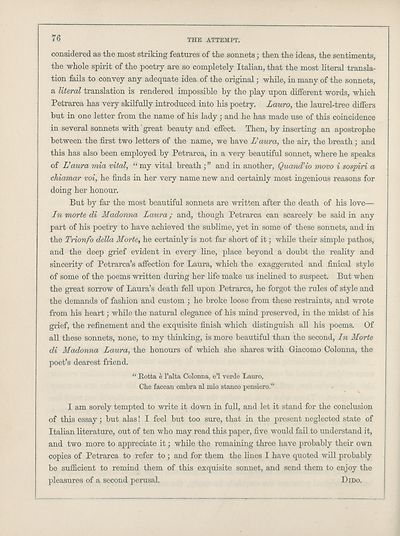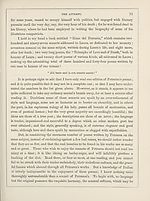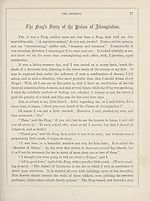Download files
Complete book:
Individual page:
Thumbnail gallery: Grid view | List view

76 THE ATTEMPT.
considered as the most striking features of the sonnets; then the ideas, the sentiments,
the whole spirit of the poetry are so completely Italian, that the most literal transla¬
tion fails to convey any adequate idea of the origiaal; while, in many of the sonnets,
a literal translation is rendered impossible by the play upon different words, which
Petrarca has very skilfully introduced into his poetry. Lauro, the laurel-tree differs
but in one letter from the name of his lady ; and he has made use of this coincidence
in several sonnets with' great beauty and effect. Then, by inserting an apostrophe
between the first two letters of the name, we have Laura, the air, the breath; and
this has also been employed by Petrarca, in a very beautiful sonnet, where he speaks
of Laura mia vital, " my vital breath;" and in another, Quand'io movo i sospiri a
chiamiar voi, he finds in her very name new and certainly most ingenious reasons for
doing her honour.
But by far the most beautiful sonnets are written after the death of his love—
In morte di Madonna Laura; and, though Petrarca can scarcely be said in any
part of his poetry to have achieved the sublime, yet in some of these sonnets, and in
the Trionfo della Morte, he certainly is not far short of it; while their simple pathos,
and the deep grief evident in every line, place beyond a doubt the reality and
sincerity of Petrarca's affection for Laura, which the exaggerated and finical style
of some of the poems written during her life make us inclined to suspect. But when
the great sorrow of Laura's death fell upon Petrarca, he forgot the rules of style and
the demands of fashion and custom ; he broke loose from these restraints, and wrote
from his heart; while the natural elegance of his mind preserved, in the midst of his
gi'ief, the refinement and the exquisite finish which distinguish all his poems. Of
all these sonnets, none, to my thinking, is more beautiful than the second. In Morte
di Madonna Laura, the honours of which she shares with Giacomo Colonna, the
poet's dearest friend.
" Rotta e I'alta Colonna, e'l vertle Lauro,
Che facean ombra al mio stance pensiero."
I am sorely tempted to write it down in full, and let it stand for the conclusion
of this essay; but alas! I feel but too sure, that in the present neglected state of
Italian literature, out of ten who may read this paper, five would fail to understand it,
and two more to appreciate it; while the remaining three have probably their own
copies of Petrarca to refer to ; and for them the lines I have quoted will probably
be sufficient to remind them of this exquisite sonnet, and send them to enjoy the
pleasures of a second perusal. Dido.
considered as the most striking features of the sonnets; then the ideas, the sentiments,
the whole spirit of the poetry are so completely Italian, that the most literal transla¬
tion fails to convey any adequate idea of the origiaal; while, in many of the sonnets,
a literal translation is rendered impossible by the play upon different words, which
Petrarca has very skilfully introduced into his poetry. Lauro, the laurel-tree differs
but in one letter from the name of his lady ; and he has made use of this coincidence
in several sonnets with' great beauty and effect. Then, by inserting an apostrophe
between the first two letters of the name, we have Laura, the air, the breath; and
this has also been employed by Petrarca, in a very beautiful sonnet, where he speaks
of Laura mia vital, " my vital breath;" and in another, Quand'io movo i sospiri a
chiamiar voi, he finds in her very name new and certainly most ingenious reasons for
doing her honour.
But by far the most beautiful sonnets are written after the death of his love—
In morte di Madonna Laura; and, though Petrarca can scarcely be said in any
part of his poetry to have achieved the sublime, yet in some of these sonnets, and in
the Trionfo della Morte, he certainly is not far short of it; while their simple pathos,
and the deep grief evident in every line, place beyond a doubt the reality and
sincerity of Petrarca's affection for Laura, which the exaggerated and finical style
of some of the poems written during her life make us inclined to suspect. But when
the great sorrow of Laura's death fell upon Petrarca, he forgot the rules of style and
the demands of fashion and custom ; he broke loose from these restraints, and wrote
from his heart; while the natural elegance of his mind preserved, in the midst of his
gi'ief, the refinement and the exquisite finish which distinguish all his poems. Of
all these sonnets, none, to my thinking, is more beautiful than the second. In Morte
di Madonna Laura, the honours of which she shares with Giacomo Colonna, the
poet's dearest friend.
" Rotta e I'alta Colonna, e'l vertle Lauro,
Che facean ombra al mio stance pensiero."
I am sorely tempted to write it down in full, and let it stand for the conclusion
of this essay; but alas! I feel but too sure, that in the present neglected state of
Italian literature, out of ten who may read this paper, five would fail to understand it,
and two more to appreciate it; while the remaining three have probably their own
copies of Petrarca to refer to ; and for them the lines I have quoted will probably
be sufficient to remind them of this exquisite sonnet, and send them to enjoy the
pleasures of a second perusal. Dido.
Set display mode to: Large image | Transcription
Images and transcriptions on this page, including medium image downloads, may be used under the Creative Commons Attribution 4.0 International Licence unless otherwise stated. ![]()
| Ladies' Edinburgh Debating Society publications > Attempt > Volume 3 > (90) Page 76 |
|---|
| Permanent URL | https://digital.nls.uk/104344312 |
|---|
| Attribution and copyright: |
|
|---|

